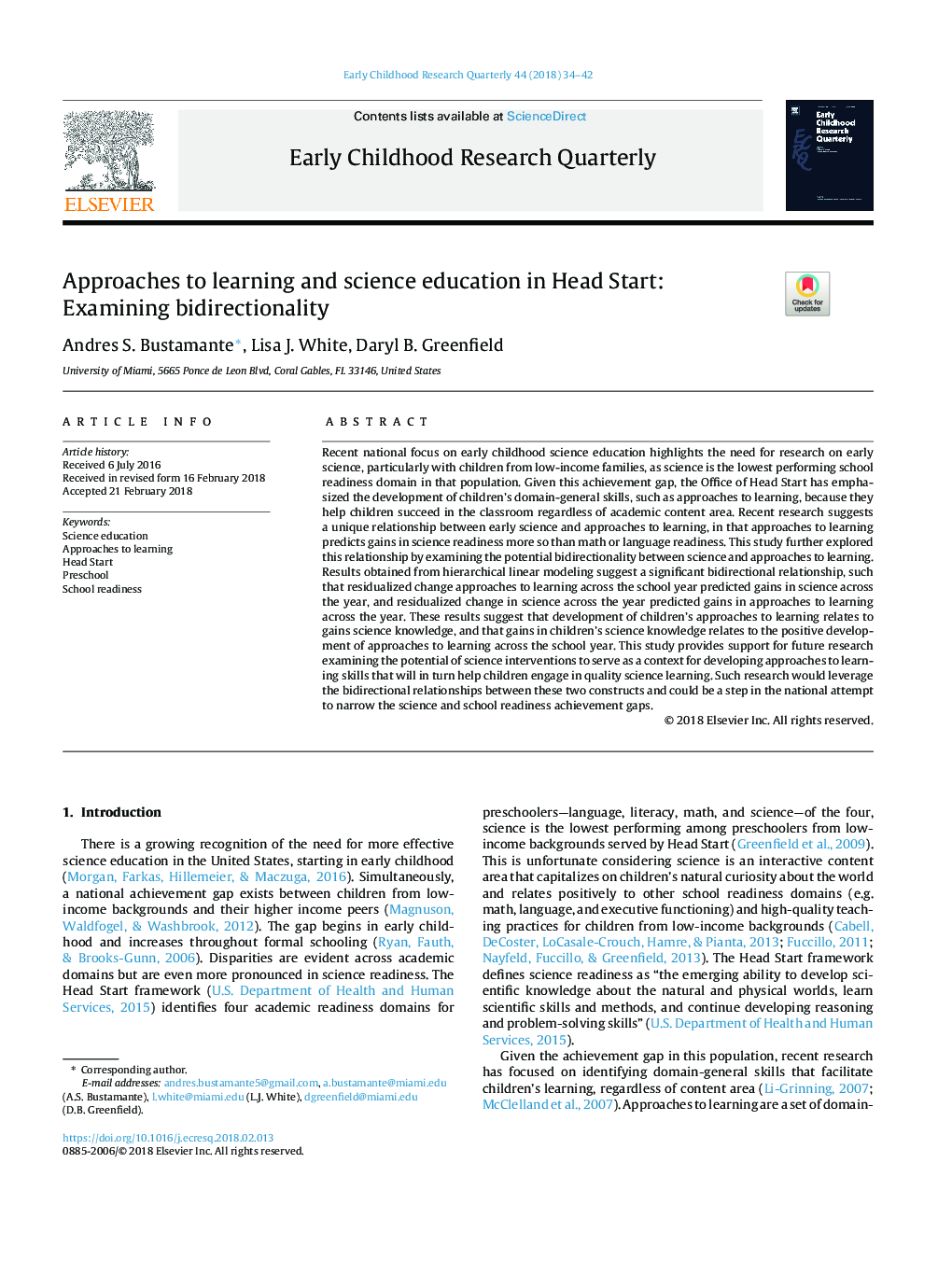| کد مقاله | کد نشریه | سال انتشار | مقاله انگلیسی | نسخه تمام متن |
|---|---|---|---|---|
| 6840517 | 1434711 | 2018 | 9 صفحه PDF | دانلود رایگان |
عنوان انگلیسی مقاله ISI
Approaches to learning and science education in Head Start: Examining bidirectionality
ترجمه فارسی عنوان
رویکردهای آموزشی و آموزش علمی در سر آغاز: بررسی دو طرفه
دانلود مقاله + سفارش ترجمه
دانلود مقاله ISI انگلیسی
رایگان برای ایرانیان
کلمات کلیدی
آموزش علوم، رویکردهای یادگیری، شروع سر پیش دبستانی، آمادگی مدارس،
ترجمه چکیده
تمرکز اخیر ملی در زمینه آموزش علوم زودرس دوران کودکی، نیازمند تحقیق در مورد علم اولیه است، به ویژه کودکان از خانواده های کم درآمد، چرا که علم پایین ترین سطح آمادگی در مدرسه در این جمعیت است. با توجه به این شکاف دستاورد، اداره سرپرستی بر توسعه مهارت های عمومی دامنه کودکان، مانند روش های یادگیری، تاکید دارد؛ چرا که آنها صرف نظر از محتوا دانشگاهی به موفقیت در کلاس درس کمک می کنند. تحقیقات اخیر نشان می دهد که ارتباط منحصر به فرد بین علم اولیه و رویکرد به یادگیری، در آن روش ها برای یادگیری پیش بینی می کند دستاوردهای آمادگی علمی بیشتر از آمادگی ریاضی یا زبان. این مطالعه با بررسی این دو جانبه بالقوه بین علم و رویکردهای یادگیری، این رابطه را بررسی کرد. نتایج حاصل از مدل سازی خطی سلسله مراتبی نشان می دهد که رابطه دو طرفه مهم است، به طوری که تغییرات باقی مانده برای یادگیری در طول سال تحصیلی، پیشرفت های علمی در طول سال را پیش بینی می کند، و تغییرات باقی مانده در علم در سال، پیش بینی دستاوردهای روش های یادگیری در طول سال را پیش بینی می کند. این نتایج نشان می دهد که توسعه رویکرد کودکان به یادگیری مربوط به کسب دانش علمی است و پیشرفت در دانش علمی کودکان مربوط به توسعه مثبت روش های یادگیری در طول سال تحصیلی است. این مطالعه حمایت از تحقیقات آینده را در زمینه پتانسیل مداخلات علمی ارائه می دهد تا به عنوان یک زمینه برای توسعه رویکردها به مهارت های یادگیری کمک کند که به نوبه خود به کودکان کمک می کند تا در آموزش علمی با کیفیت کار کنند. چنین تحقیقاتی می تواند روابط دوجانبه بین این دو ساختار را به اثبات برساند و می تواند یک گام در تلاش ملی برای محدود ساختن شکاف پیشرفت علمی و آمادگی مدارس باشد.
موضوعات مرتبط
علوم انسانی و اجتماعی
روانشناسی
روان شناسی کاربردی
چکیده انگلیسی
Recent national focus on early childhood science education highlights the need for research on early science, particularly with children from low-income families, as science is the lowest performing school readiness domain in that population. Given this achievement gap, the Office of Head Start has emphasized the development of children's domain-general skills, such as approaches to learning, because they help children succeed in the classroom regardless of academic content area. Recent research suggests a unique relationship between early science and approaches to learning, in that approaches to learning predicts gains in science readiness more so than math or language readiness. This study further explored this relationship by examining the potential bidirectionality between science and approaches to learning. Results obtained from hierarchical linear modeling suggest a significant bidirectional relationship, such that residualized change approaches to learning across the school year predicted gains in science across the year, and residualized change in science across the year predicted gains in approaches to learning across the year. These results suggest that development of children's approaches to learning relates to gains science knowledge, and that gains in children's science knowledge relates to the positive development of approaches to learning across the school year. This study provides support for future research examining the potential of science interventions to serve as a context for developing approaches to learning skills that will in turn help children engage in quality science learning. Such research would leverage the bidirectional relationships between these two constructs and could be a step in the national attempt to narrow the science and school readiness achievement gaps.
ناشر
Database: Elsevier - ScienceDirect (ساینس دایرکت)
Journal: Early Childhood Research Quarterly - Volume 44, 3rd Quarter 2018, Pages 34-42
Journal: Early Childhood Research Quarterly - Volume 44, 3rd Quarter 2018, Pages 34-42
نویسندگان
Andres S. Bustamante, Lisa J. White, Daryl B. Greenfield,
